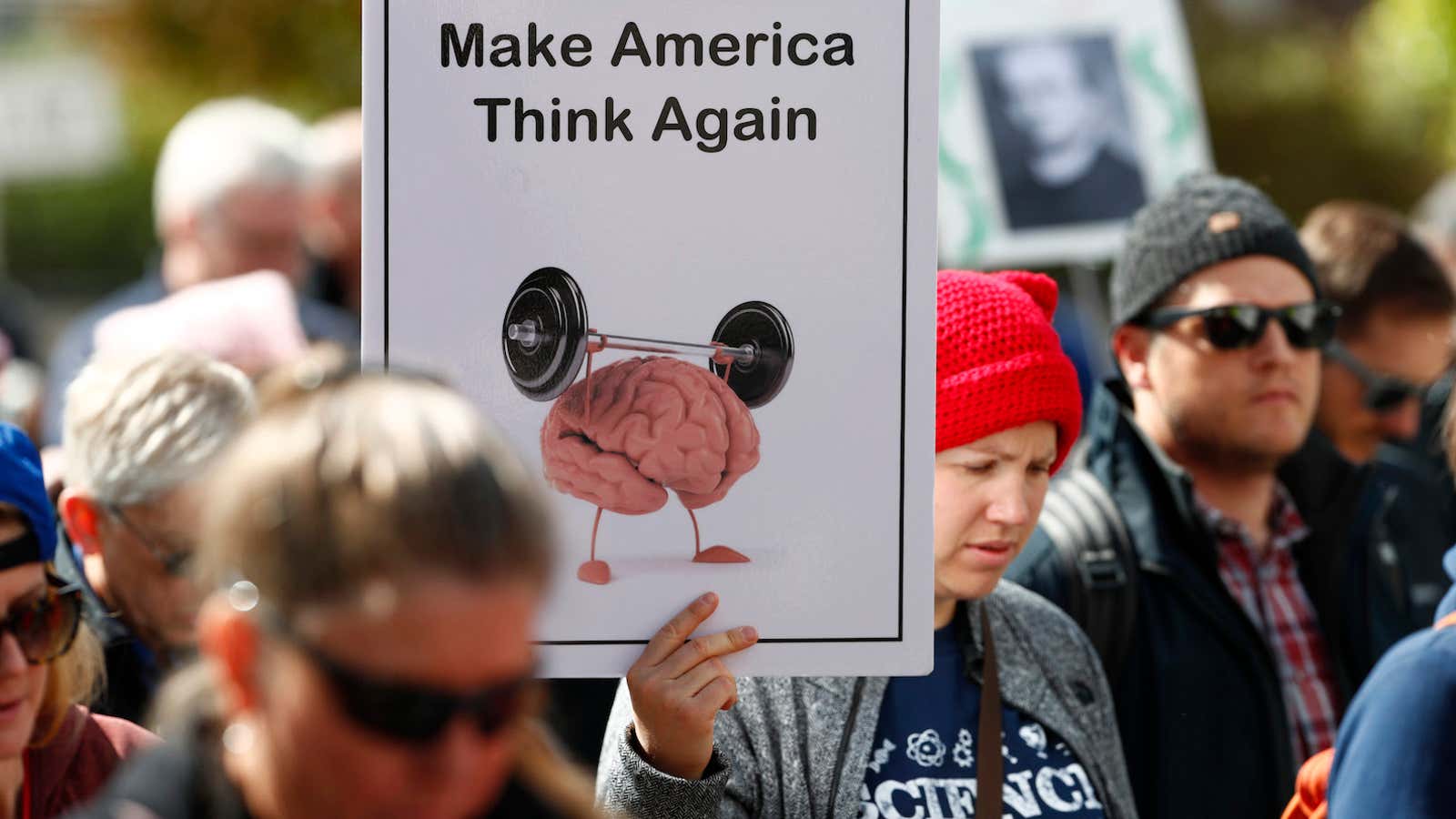Washington DC
On April 22, thousands flocked to the National Mall to participate in the March for Science, a first-of-its-kind protest that was inspired by a Reddit thread the day US president Donald Trump was sworn into office. Those who couldn’t make it to the US capital were invited to stream the event remotely or participate in more than 600 satellite marches organized globally.
Broadly, the purpose of the march was to stand up for science in the wake of an administration that threatens its work and acceptance. President Trump has stated that he thinks climate change isn’t real, and that vaccines cause autism. Since assuming office, he’s limited the Environmental Protection Agency’s power to protect Americans from pollution, proposed big cuts to federal funding for research, and tried to implement an immigration ban that would block the many foreign scientists working in US laboratories.
But in terms of tangible outcomes, the march’s purpose is a little less clear. Organizers intended it to show lawmakers that people do care about science, and that scientists can make up a vocal part of the community. Another hope articulated in the weeks since the planning began is that the action would inspire scientists to consider leaving their benches and run for political office. “Science is above politics, but politicians are not ashamed to muddle in science,” says Shaunnesy Naughton, a chemist and founder of the group 314Action, which is dedicated to helping scientists become elected officials. “A way to combat that is to have a seat at the table.”
Naughton says that since 314Action’s founding in January, more than 4,000 scientists have registered, indicating that they may want to run for local or national office. Already, some scientists have announced that their plans to run for Congress.
On this rainy Earth Day, I went out to the march in Washington to talk to scientists there to see if running for office was something they’d actually consider. The vast majority I spoke with said it wasn’t, although two said they may be interested in running for local office. As of now, most felt there were too many barriers to entry into politics. Below are the four answers that kept popping up in my conversations with scientist marchers:
They love their work and don’t want to leave it
“I think I can be active in my community without having to hold office,” says Jeremy Sutherland, a plant biologist who works on contract with the US Department of Agriculture. “I love what I do, and don’t want to leave it.”
That’s despite the fact that the federal hiring freeze that Trump has put into place means that he and his colleague Leandra Knight, also a plant biologist, would be unable to land permanent positions anytime soon.
They don’t like being in the spotlight
For many scientists, the idea of glad-handing voters and having them judge your competency based on non-scientific measures is simply a bridge too far. After all, theirs is a field that prides itself on letting data do the talking. Many of them undoubtedly prefer it this way. ”I’m just not an ‘in-the-spotlight’ kind of guy,” says Kelly, a neuroscientist from Greenbelt, Maryland.
“I’m not that kind of person, either,” his friend Jeremy, a mathematician, chimed in. But advising policymakers might be a possibility. Jay, another neuroscientist they were marching with, said he wouldn’t rule it out; he still has one more year before he gets his doctorate from the University of Pittsburgh. (There’s an opening right now in the US Office of Science and Technology Policy; president Trump has yet to appoint his advisor in that role.)
They don’t think they’re “people” people
There’s a stereotype—not helped by popular culture—that scientists are difficult to speak to, that they’re involved in their own studies, that they’re out of touch with the rest of the world, and that they’re unskilled at talking to lay people about their work. I found little of this among the scientists I encountered today (although this could be the result of selection bias; after all, these folks had made it out to a march). I had a perfectly pleasant conversation with Bruce Behnbostal, a retired engineer from Orlando, Florida. But while he said he enjoyed talking to people about his work, he betrayed no interest in running for office when I asked if he would ever consider it. ”I don’t think I’m enough of a people person for that,” he said.
They don’t think they have the right training
Obtaining a PhD or a medical degree is no easy feat. Students usually decide in their undergraduate years that they want to pursue the extra schooling, and spend their summers working in labs or prepping for graduate-school entrance exams. Once they make it to graduate school, they have another four to seven years before they complete their education.
Future politicians generally tend to take a different path. “You have to start volunteering in your local political party and work your way up, and most of us are getting PhDs at that time” says Marc Running, a plant biologist at the University of Louisville.
If the march doesn’t inspire many career changes, that doesn’t mean it was for naught. There are lots of ways to be involved in government affairs without seeking election to office. Today’s march is just one example of that, and it could inspire a host of others. ”I think I’ll be inclined to be more politically active,” says marcher Ruth Sanchez, a cell biology student about to graduate from the College of New Jersey.
